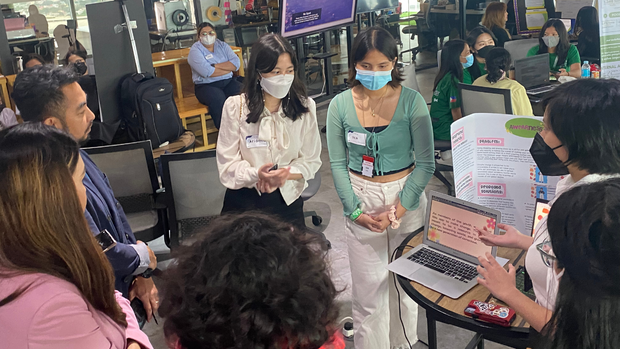An application that promotes proper waste segregation and disposal called “scr/app” emerged victorious at the week-long hackathon competition organized by youth-led organization “The Purposeful Mochii” and hosted by Accenture Philippines at the Philippine Innovation Hub in Bonifacio Global City, Taguig City.

The “Breaking Barriers, Building Bridges: A Hackathon for Girls” competition also marked the ‘International Day of Women and Girls’ celebration and pitted teams comprised of girls aged 10-17 years old in a formal hackathon which includes a series of workshops, solution pitching, and rapid prototyping.
According to Accenture Philippines, participants were invited at the end of the event to join a community of like-minded students as well as take part in global tech competitions.
The hackathon, among other initiatives, is the firm’s way of collaborative talent upskilling and fostering STEM (Science, Technology, Engineering, Mathematics) education and career interest that involves external groups and communities.
The overall champion and special award titles were claimed by teams hailing from De La Salle Santiago Zobel School, the best prototype award was given to Woodrose School for their sustainable fashion platform, and the STEC Cebu team was recognized as the most active team among all participants.
“I come from ‘The Purposeful Mochii’ which is a little organization that I started…we help mobilize kids harness information and innovation. To recap our hackathon journey, we started last week with our virtual learning sessions and our workshops and spent one week working on our projects and communicating with our mentors,” said 14-year-old Mona Obedoza, founder of The Purposeful Mochii.
Beyond building a community led by women who share strong interest and passion for STEM, the program aims to demystify the field by enabling participants to create their own applications, as well as develop critical thinking, problem solving, and collaboration skills.
The workshops, on the other hand, serves as a way to teach young girls the basics of coding and AI and how these tools can be applied to solve real-world problems like climate change, education, and agriculture.
“I’ve been doing IT for 20 years and I first started (coding) when I was 15. When I went to college, there were only seven girls in computer science. I’m glad to see a room full of young ladies and I’m very ecstatic to see that your love for coding brought you here. I hope that today will be one of the many ways that we will have partnerships together,” said Jenny Hans, managing director at Accenture Philippines, as she addressed the contestants during the event.
In a report by nonpartisan fact tank Pew Research Center, female representation varies widely across STEM occupations, with the large majority taking on health-related professions while remaining underrepresented in other job clusters like computing and engineering.
Before the culmination event that took place on February 11, all the participants had to learn how to research, code, and pitch their own projects through online workshops led by Accenture Philippines. During this stage, they were able to meet their assigned mentors who will guide them in their hackathon journey.
By February 6-10, each team was tasked to produce their project thesis, a pitch, and the application itself. At this point, the students had to manage their time effectively outside of school hours to work on their projects and consult with their mentors. Finally, each team had to present their research data, along with their prototype app, during culmination day.




